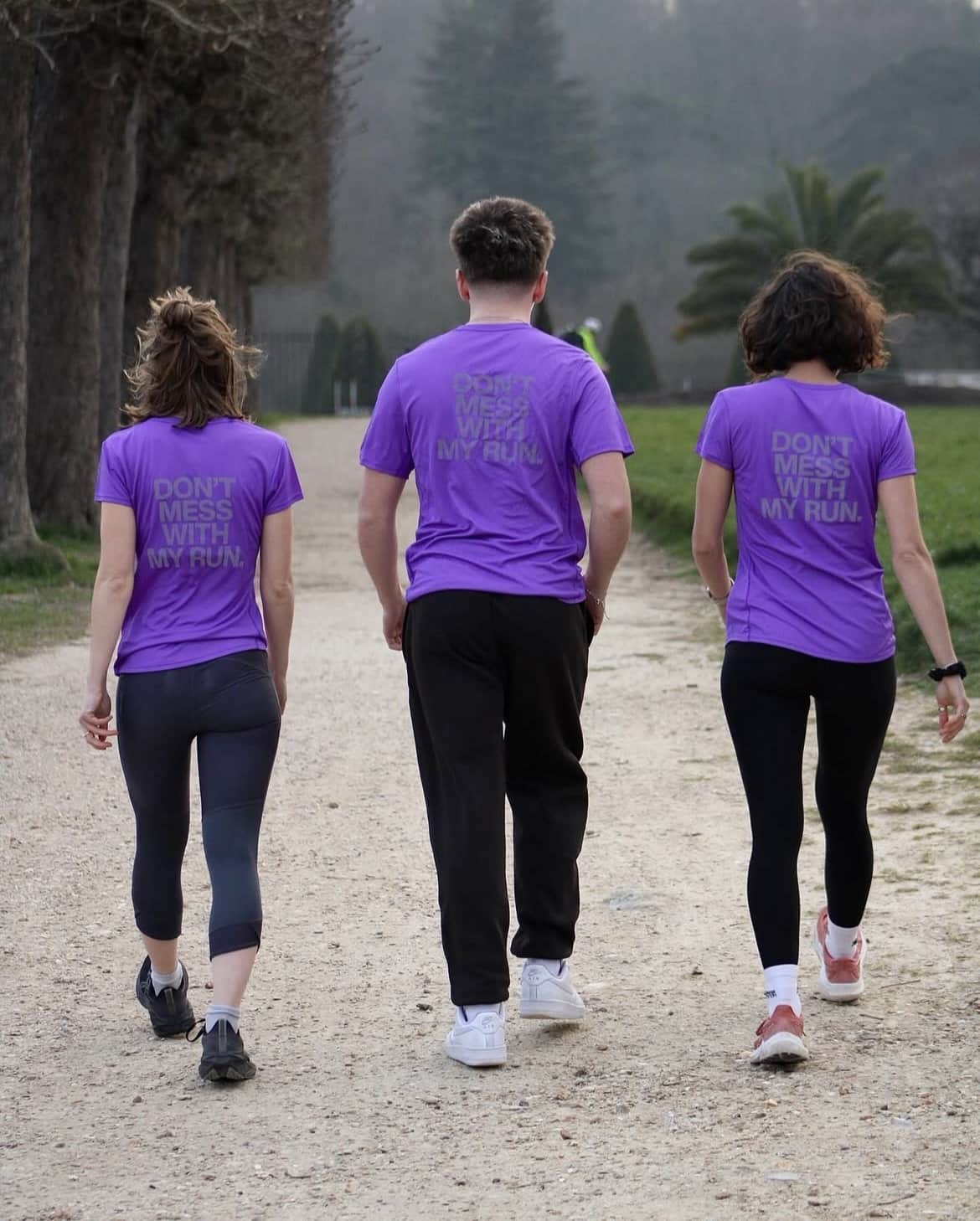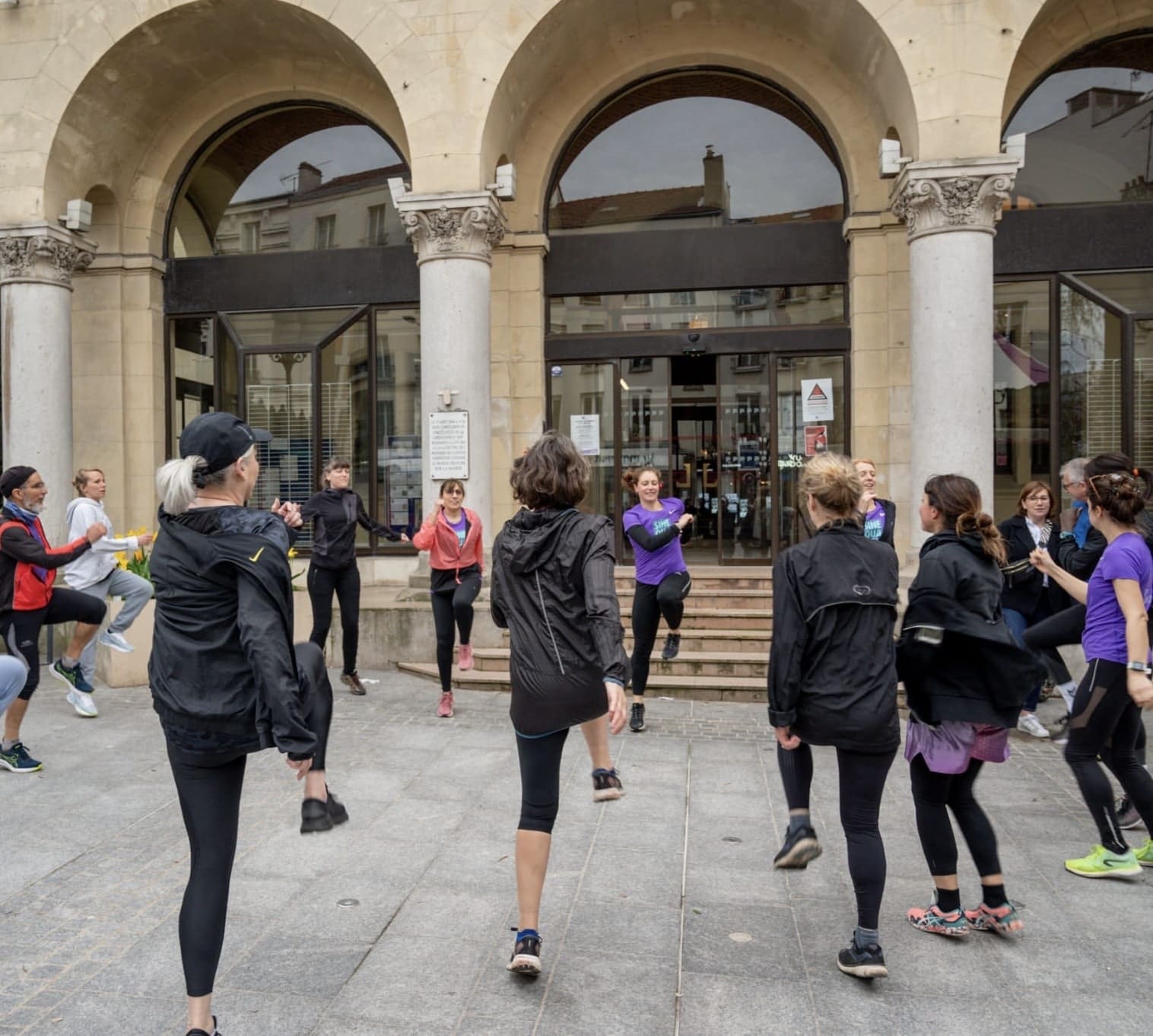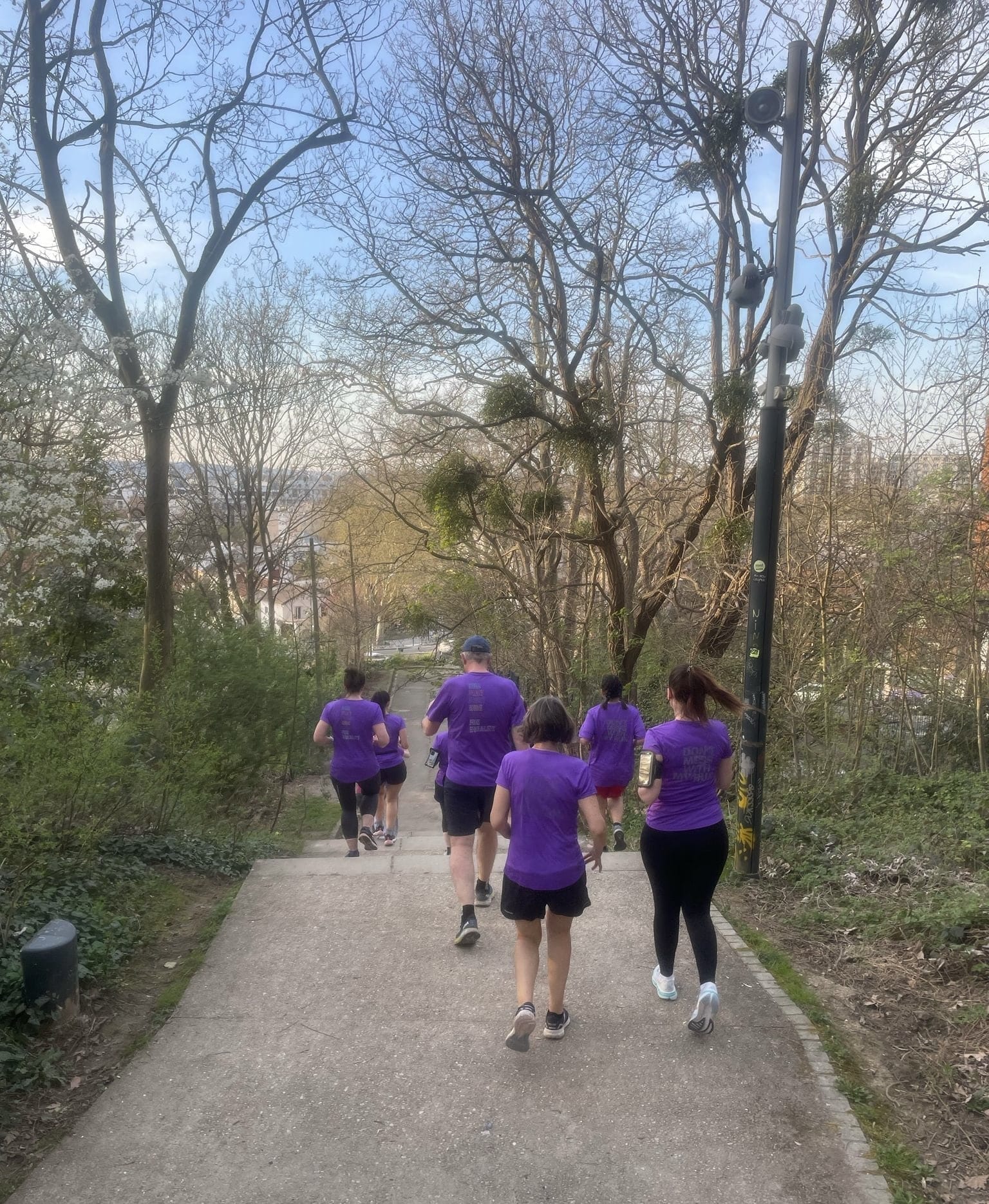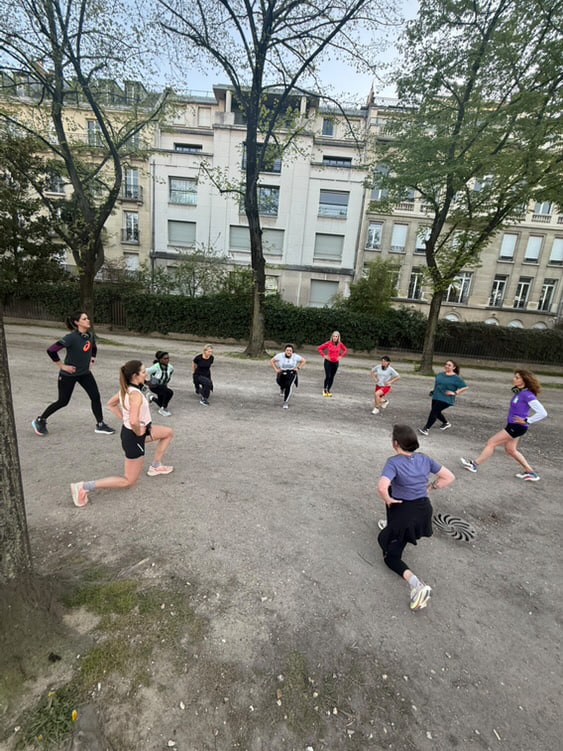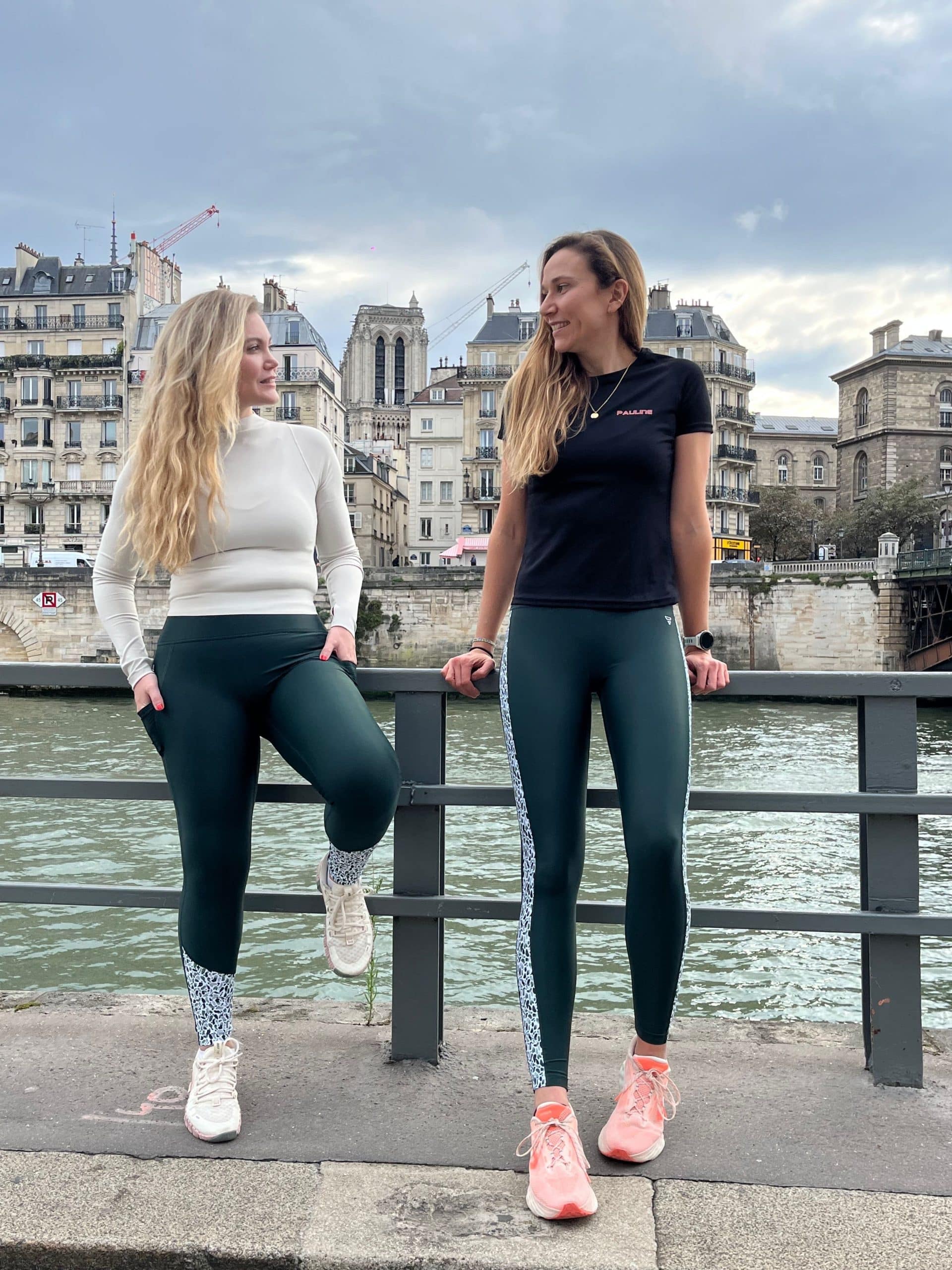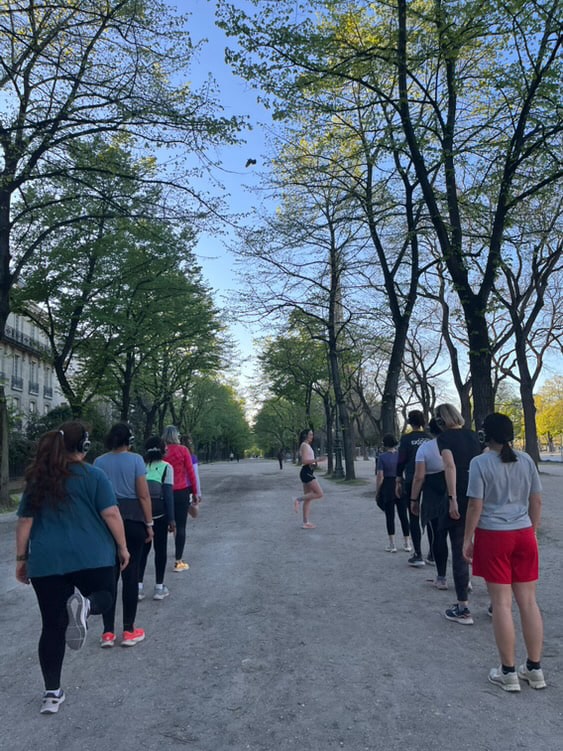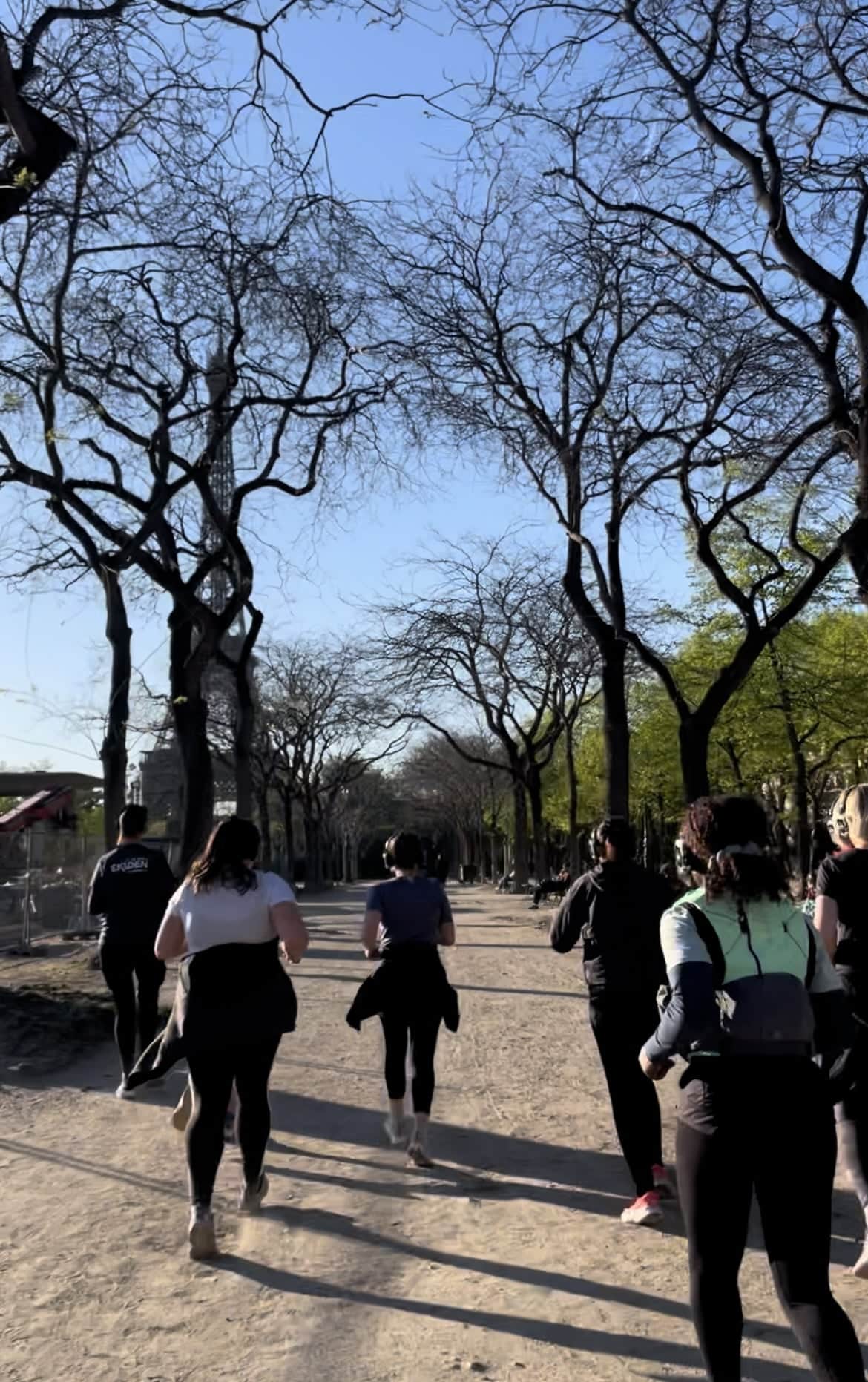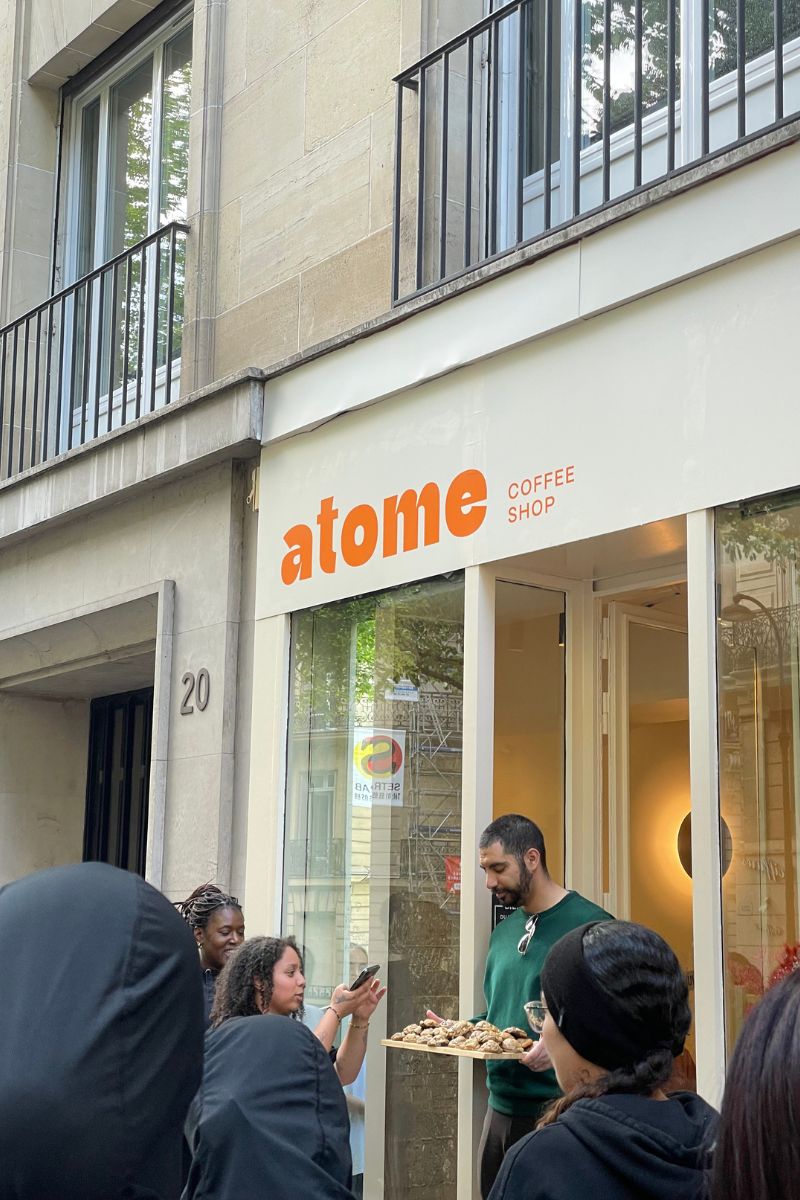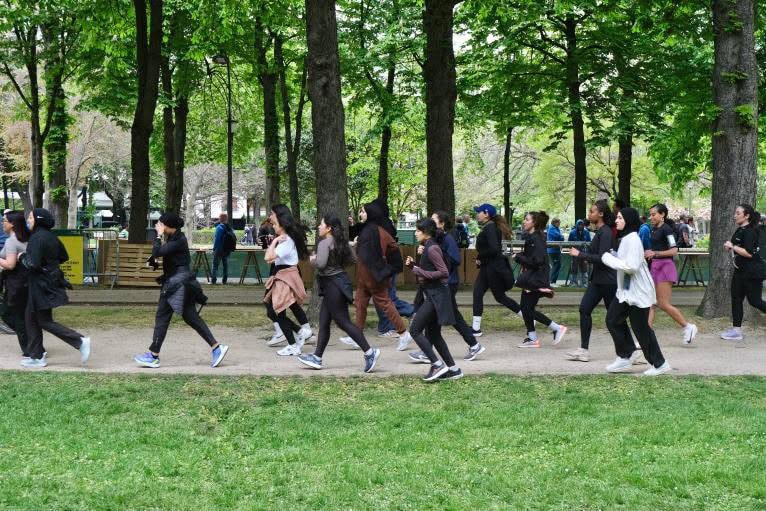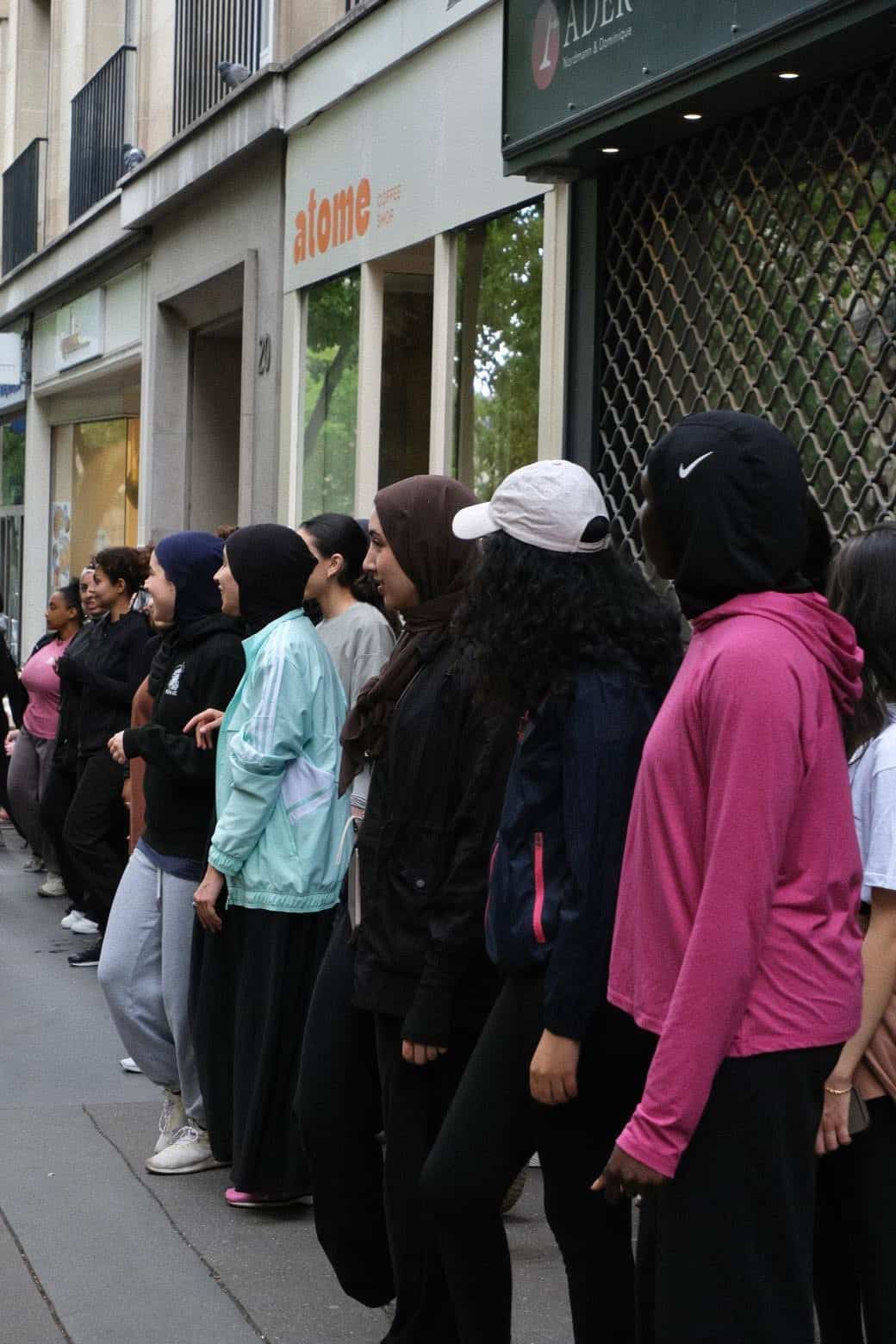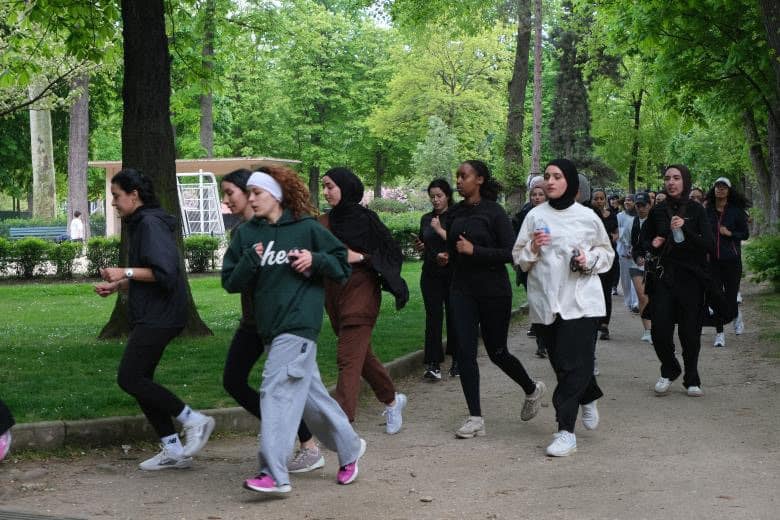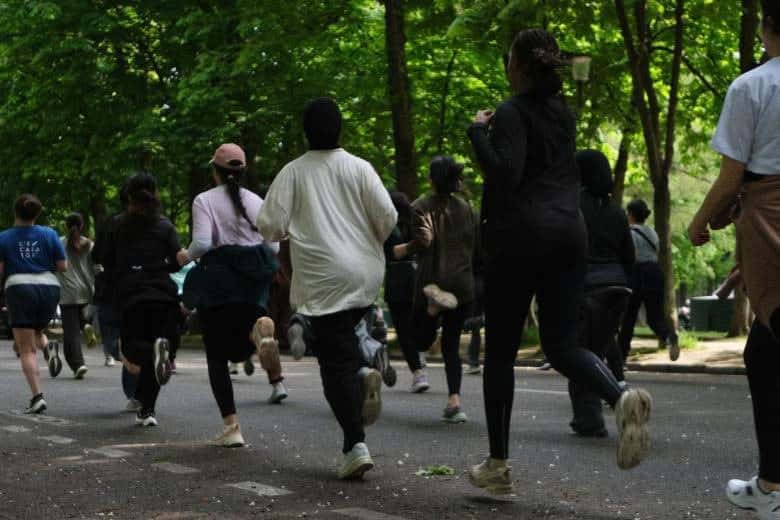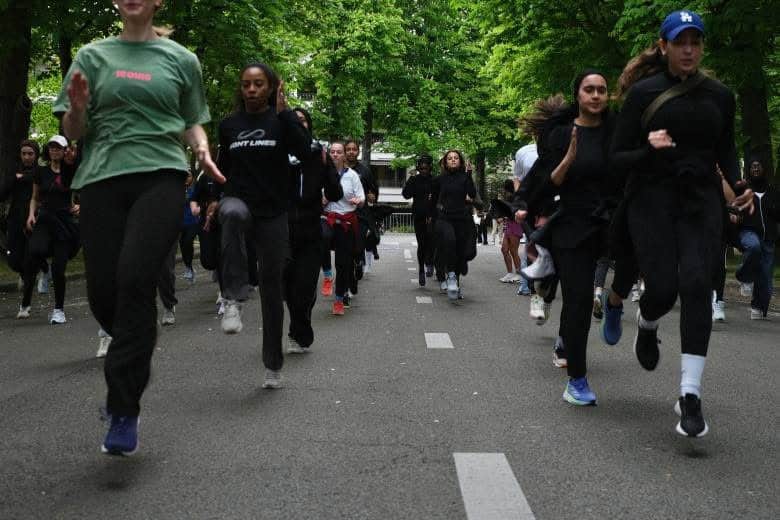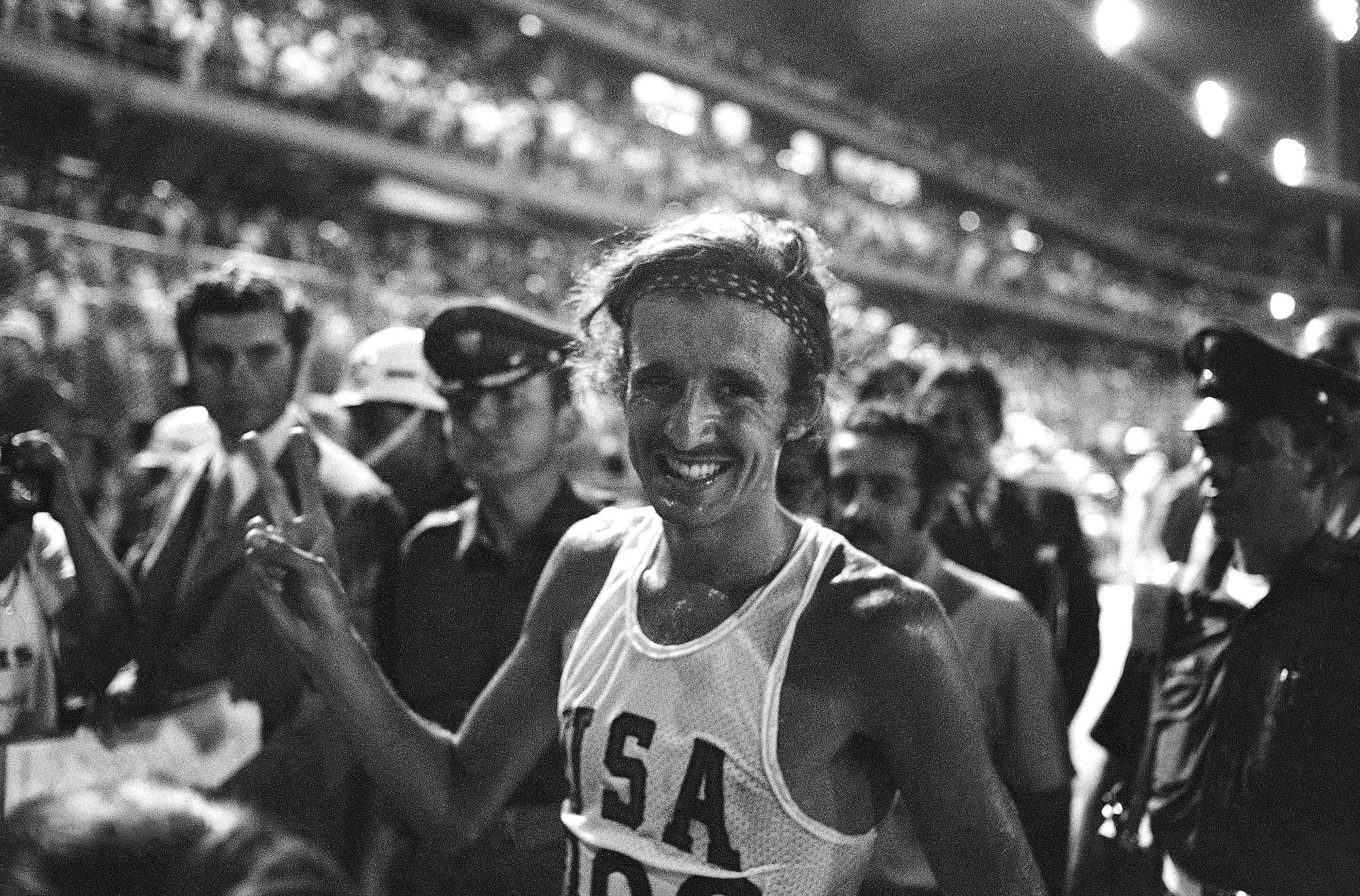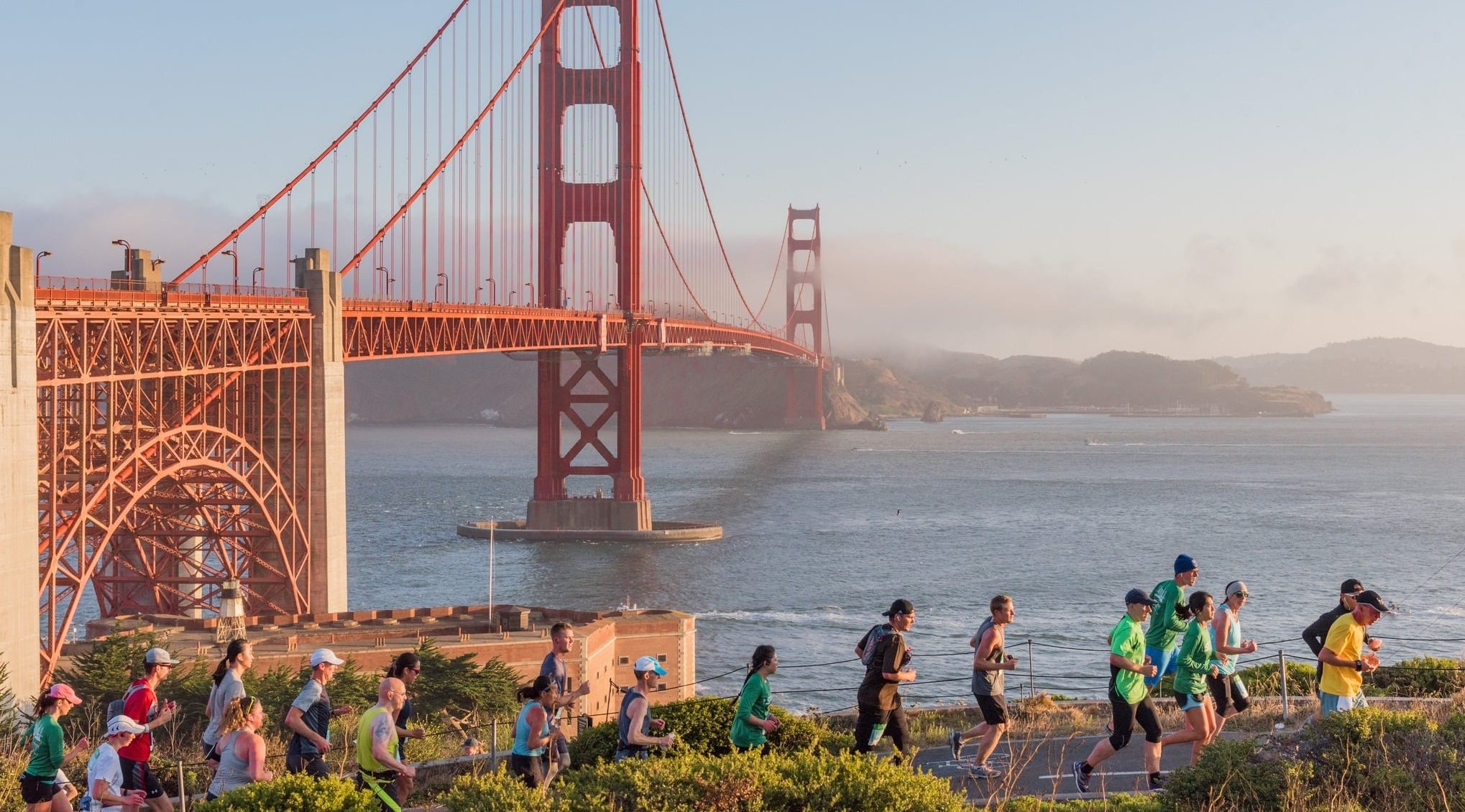One stride at a time: women are getting their sneakers back on together
Women’s running collectives are gaining visibility, and that’s a good thing. Voices are being heard, and initiatives are emerging to enable women to engage in sports freely. The associations Sine Qua Non and Run’Elles, as well as the community Les Belles Foulées, all offer supportive, sometimes mixed, environments where enjoyment takes precedence over performance.
| 3 sports collectives dedicated to women
Each of the three associations develops its own actions, although all share the desire to bring people together. The Sine Qua Non association, created in 2017, takes its name from “the respect and understanding of ‘no,’ a sine qua non for respectful relationships,” and is based on the idea that “sport is a tool for reclaiming public space.“
The Sine Qua Non Squad offers sports sessions combining 5 to 6 km of running with muscle strengthening exercises, organized in various locations to give everyone the opportunity to run. These monthly gatherings are a direct response to numerous testimonies from female runners exposed to the critical looks of some men or harassed during their runs. On a fixed day each month, they come together wearing their purple t-shirts emblazoned with the Sine Qua Non logo. More than just a visibility symbol, this t-shirt has become a marker of identity, carrying a renewed activist message each year: “Don’t mess with my run“.
The Run’Elles association, founded in September 2024, welcomes women of all ages to explore running in a relaxed manner. Get-togethers are announced sporadically on their social networks. These events take the form of running sessions led by the three co-founders, Dounia, Hafsa, and Inès, sometimes accompanied by external speakers to discuss sports, femininity, or share a pleasant gourmet break. Their main mission is to democratize access to running, the heart of the project, while addressing women’s issues often left unspoken. Kat, who lends “a helping hand whenever she can,” explains: “The goal is to allow everyone to exercise and to take them away from their daily routine.”
The Belles Foulées community mixes digital with the physical. Pauline, its founder, has been recording podcasts since 2022 to support women in their running practice. With the Run and Respire events happening every first Monday of the month, she addresses “women who love the collective, who still struggle to find their place, who doubt, who have many questions, who don’t feel comfortable.” She adds: “I’m one of those women.” Together with Sarra, who assists her on breathing and relaxation, they are creating a space that combines performance and well-being, without pitting the two against each other.
| Essential initiatives driven by committed women
None of this would exist without the women through whom these projects were born. Generally, the initiative comes from a woman who found allies to support her project. All started from a simple observation: women do not enjoy the same freedom as men to run in public spaces. So how can we change this? How do we create safe, accessible, inspiring places to dare to venture out together? These collectives are a concrete response, born from experience, lived stories, sometimes anger, often the desire to change things.
In every Sine Qua Non Squad session, an ambassador is there to guide and unite. Charline, an ambassador in Les Lilas (93) since March, shares: “My role is to bring people to Les Lilas and to be there to allow women who would like to go running but wouldn’t dare go alone for fear of being ashamed, or whistled at in the street… to do it at least once a month with good company.” A precious presence, especially when some fear “running at night in the park.”
Behind all this is Mathilde Castres, the association’s founder, whose personal journey resonates with many others. A victim of sexual assault, she found in running “a wonderful tool of resilience,” sparking the idea of “creating a race at nightfall, to rally against sexist and sexual violence.” With Tiphaine, met around this shared feeling of “insecurity,” the first Sine Qua Non Run was born around the Bassin de La Villette in Paris. Quickly, testimonies flowed in. Like that of a woman: “It had been 10 years since I last ran because I was assaulted during a jog. Your race got me back into my sneakers!”
The Squads then came about, initially organically. The idea is simple: run once a month in symbolic places, in mixed groups, to raise awareness about behaviors without stigmatizing. “Our goal is for them to dare to run alone,” Mathilde explains, “because they have claimed the space and things have changed.” At times, Charline does strength exercises in the middle of a neighborhood: a visible presence that sparks curiosity and exchanges. “It creates a dialogue… and people understand there’s a real issue.” This isn’t the case everywhere, but in Les Lilas, the town hall is a strong local supporter. The mayor, Lionel Benharous, and the sports official Richard Le Pontois, regularly participate in the sessions.
When a group forms, a question is posed: what does everyone do before going for a run? The answers vary by gender: “The man just grabs his watch… the woman asks herself countless questions…” The aim is to develop the Squads “wherever people want them because a woman should be able to run wherever, whenever, and in whatever attire she wants…” Men are welcome in this process. Their awareness is essential.
Pauline launched Les Belles Foulées with a similar mindset. During the April Run and Respire, during the warm-up, she asked a direct question: “How many of you are wearing shorts tonight? Who never has and why?” Less than half of the participants were wearing them, even though the sun was out in full force this late Monday.
Pauline initially created guided audio sessions, but soon felt the need to meet those she was training remotely and to welcome newcomers. “It’s great to be able to put women in an environment where they feel good, just among women, where they can talk about anything without taboo.” She values kindness in a safe environment: “There’s no judgment. It’s very healthy.”
Through Run and Respire, she offers an alternative to traditional clubs, which can sometimes be intimidating. “I’m the kind of person who wouldn’t dare join a club because they go too fast. They’re always checking their timers.” Here, there’s no pressure: a community for relaxation and rejuvenation. “As we progress, our project grows. It’s about helping women dare to run and assert themselves in public.” Discussing shorts, self-confidence, all contribute to a broader movement: “Empowering women.” Next challenge? Preparing a group of women to run a trail. A step closer to autonomy and freedom of movement.
Dounia, Hafsa, and Inès met through Golden Blocks. Their friendship naturally led to the creation of Run’Elles, founded last September. Their project goes beyond running: creating a space to motivate, push boundaries, but also to exchange, debate, gather, over coffee, dessert, or simply to share a moment after the effort. Those seeking performance find what they want, as well as those who just want to run for fun.
Their initial project last summer in Indonesia, where schoolgirls pushed themselves in a relay event, often barefoot, reinforced their decision to create their association. Today, this experience drives them to organize events in France and abroad, in isolated areas. With their Run Women Tour, they go where women express a need for connection and momentum to create their own community. Their objective, “is really to intervene in all departments.” They have been in Val-d’Oise (95), Hauts-de-Seine (92), and Paris. Soon, they will be in other departments in the Ile-de-France region. They are also in high demand elsewhere, particularly in Nice and Lille. For them, the suburbs are a way to include all women, whether they are mothers or young women, by providing accessible sports spaces.
Hafsa encourages everyone to give it a try: “Whatever your apprehensions, come run with Run’Elles and you will come out of it enhanced.” Feedback speaks for itself: “Thank you so much, I didn’t realize I was capable of this!”
| Satisfied participants
“Pushing ourselves together” is the goal of the runners of the Belles Foulées, a community that gathers well beyond the neighborhood. Some participants come from afar, like Constance, who lives in Lille, or another who came especially from Picardy. Others live nearby tonight, like Lydie, who just has to cross the Champ de Mars to reach the RITM room. Everyone organizes to be there, even if it means adjusting their schedule. “They make this time sacred,” Pauline points out.
Isabelle, there for the fourth time, has been running for less than a year. She shares: “I like having the coach there for me. I feel like it really helps me improve.” She adds: “What I love most is the team spirit among women and the fact that there are different levels. Everyone contributes to the other.” Between the Belles Foulées for interval training and the Kah-Studio for long distances, Isabelle has found a good balance in her practice. For her, it’s primarily the collective that counts. Just like for Lydie, a regular in her sixties, who comes to “motivate herself with others.”
After the sessions, thanks abound: “Thank you, it was great.” Some leave feeling energized: “I’m starting my week, I feel full of energy… I was dancing in the subway on my way home.” They often come with technical expectations (how to improve, go faster) but mainly retain the “magic, enthusiasm, lightness. That’s what we want to transmit more than the success of going faster.”
For the eighth Run’Elles event organized on Sunday, April 13 in the 16th arrondissement of Paris with the coffee shop Atome, offering cookies at the end, about fifty participants await the start. Dounia and Hafsa, two of the founders, speak to remind everyone of the “train concept, which means joining the last ones when you’re first” so that no one ends up alone behind. Dounia emphasizes the spirit of mutual support and the goal: “Embrace enjoyment and discover running by starting with walking, then running at your own pace.”
Regulars are there, like Fella and Alia, coming directly after supporting a friend at the Paris Marathon. Even if they can’t attend every event, they maintain ties with about twenty women they met through Run’Elles. For Fella, that’s what the collective is about “There’s a real sisterhood among us.“ Chaymae adds that she loves the atmosphere: “It’s hard to make friends, but here, it’s the right setting. Plus, we go at a pace that suits everyone.” Another event in Cergy-Pontoise (95) gave birth to a team of women who meet for hikes, bike rides, and other sports activities, without judgment. For the third time, Mélissa is delighted: “Each time, it’s a joy.“ What everyone retains is the strength of the group and its benefits.
Among the newcomers, Imane confesses: “I have health issues, I was tired, and I was well-supported. This won’t be the last time I come!” Inès and Roxane, former classmates, reconnected by chance after discovering the event on Instagram. They immediately felt at home: “I was looking for a club at my level, but with the running craze today… I couldn’t see myself as a burden to a team,” Inès explains.
During the April Squad, Laurine is very motivated. A year earlier, she had started with the goal of running 3 km at the Foulées Pantinoises, encouraged by a friend registered for 10 km. Discovering Sine Qua Non in November through a story shared by the town of Les Lilas, she decided to take it “a bit more seriously.” Since then, she has participated in the monthly sessions, reassured by the group dynamic: “It’s less intimidating than being alone, if there’s danger, we can more easily avoid it.” She also finds it a real lever for progress: “It helps me maintain a steady pace and not get bored.” Next May, she will run the 10 km of Pantin with her friend.
| A training format to reclaim one’s body
The Sine Qua Non Squad adapts to numbers and needs. One or two ambassadors guide depending on attendance. While sessions are usually monthly, they may become bi-monthly according to city involvement or coach availability. For Charline, a PE teacher, triathlete, and coach, training is routine, and she does it excellently, regardless of the group’s level. This April Thursday, a dozen are gathered in Les Lilas for a circuit of about 6 km. The hilly route requires pacing adjustments, but the main thing is to exercise, without pressure. The session starts with a jog where Charline ensures the group stays together by moderating each individual’s pace.
She reminds everyone: “The idea is to stay together.” She inquires about each person’s feelings: “Is everyone okay?” Once in the park, it’s time for varied stair exercises, then off to the stadium where Charline gives instructions: “We do the first lap jogging, and those who are tired recover. The second, we speed up, before doing planks.” And continues, “At the sign, we start!” Returning to the gym, applause, a few words to conclude, and a reminder of the next meeting in May: a well-structured collective moment between effort and encouragements. “What makes Run’Elles strong is that everyone can exercise together, each at their level.” Kat summarizes the collective’s philosophy well. During jogs, those in the lead come back to support the last ones: “Come on, ladies!” you can hear.
On April 13, Dounia, a sports educator and coach, leads the session. Usually, Inès and Hafsa, equally involved co-founders, accompany her. The session begins with a jog to the Jardin du Ranelagh, a training spot. “How’s it going, ladies? Are you ready?” Dounia asks the circle of 50 participants. When questioned about the running time, “I’ll tell you 5 km, you’ll say it’s impossible, but I’ll prove otherwise.” No sound system that day, but collective energy and good weather suffice. After the warm-up, it’s time for drills, where Dounia insists: “We prefer you to exaggerate rather than not enough.” Then a game-style interval training and a final relay hype up the two teams: a crazy atmosphere, a guarantee to return. Dounia ensures those with physical issues feel comfortable, as “even if they have health problems, we can find suitable solutions.” The explanations are clear, and the movements are broken down. Unlike other clubs where performance is prioritized, here they exchange, learn, care for themselves. Running becomes a pretext to address all topics related to women, with a 360° vision, crafted by and for women.
Run’Elles doesn’t stop at sports. The goal is also to raise awareness, inform, inspire. Their first workshop was on breast cancer. Recently, an event on hair and sports resonated strongly: a professional discussed hair issues, a concern often overlooked in sports practices. On April 5, the “Sport and Menstruation” workshop with Juliana Antero, a researcher at INSEP, left a lasting impression. “The aim is really to highlight women in all aspects, even if running is what brings us together. It’s the core,” Hafsa specifies.
For this 8th Run and Respire edition, about ten women gathered to fill their energy tank for the week. The immersive experience was even more striking this time, thanks to the headphones used for the first time in daylight. Before setting off, each introduced herself with her name and a keyword: “energy“, “team spirit“, “motivation“, “challenge“… “New start, new month, new week,” Sarra concludes.
The training follows several steps: guided meditation to refocus, led by Sarra’s soothing voice; a 10-minute warm-up followed by drills explained by Pauline; then an interval session (6 x 1’/1’), “with a bit of intensity depending on our energy level” to, as she says, “feel powerful.” The group stretches, but thanks to the microphone, Pauline stays present. She encourages them, checks that everyone is keeping up, and offers alternatives. To leave no one behind during the jog, the front-runners stop and do squats while the group regroups. The spirit remains clear: value the effort and celebrate every step. About 80 women have already experienced the Run and Respire, led by Pauline and Sarra, and this is just the beginning.
Women’s running collectives Sine Qua Non, Run’Elles, and Les Belles Foulées embody a true movement of liberation and empowerment for women in public spaces. These initiatives, born from the desire to create safe and supportive environments, allow each participant to reclaim running at her own pace, without performance pressure. These communities, led by committed women, promote solidarity, mutual support, and inclusivity, while addressing often overlooked issues, such as gender-based violence and women’s freedom in public spaces.
Beyond running, these collectives provide a setting conducive to personal development, self-confidence, and the creation of strong bonds among participants, whether novices or more experienced. By bringing together women from all walks of life, these projects contribute to a profound change in mentalities, both in sports and in society.

